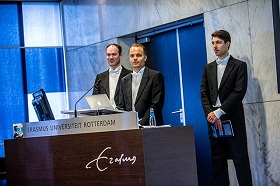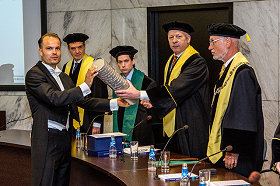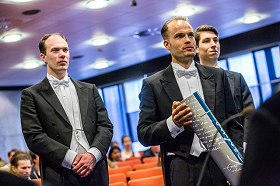PhD Defence: Understanding Salesforce Behaviour Using Genetic Association Studies
A key concern in economic modelling is factoring the effect of human traits such as emotion into models assuming purely rational behaviour. In his dissertation entitled ‘<link doctoral-programme phd-in-management phd-projects detail>Understanding Salesforce Behaviour Using Genetic Association Studies’, Wouter van den Berg uses biological processes in the body and brain to understand sales force behaviour.

Traditionally, the field of economics has differentiated itself from other sciences by studying economic behaviour from a disembodied perspective. The rejection of the bodily aspect (e.g. emotions) has yielded important insights into the behaviour of homo economicus, a self-centred, rational, utility maximizing actor. However, recent findings show that these models provide only limited ecological validity when modelling the actual choices of humans in every-day-life. Indeed, neuro-economics tries to bring back the bodily aspect in economic theory.
Using genetic association studies, Van den Berg aims to investigate the drivers of successful customer-salesperson interactions in a context where knowledge development has become crucial to the value creation process. Central to the thesis is the developing role of the contemporary sales professional. Coming from transaction-based selling and passing through an era of consultative selling sales strategies, an emerging role for sales professionals as knowledge brokers can be observed. Indeed, sales professionals are crucial in linking different parties both within and outside their firm, creating a flow of knowledge between different members of the network. In line with this, salespeople should be able to shift their strategies from a short-term focus on the (immediate) sale, to a more long-term and customer-centred approach aimed at opportunity identification.
The results presented in this thesis suggest that some sales professionals have an innate tendency to make an active effort to spot novel opportunities to help solve customers’ needs. To build long-term, valuable relationships with their customers, they will be most effective if they take a self-reliant and curious approach.
Wouter defended his dissertation at Erasmus University Rotterdam on Friday 16 May, 2014. His supervisor was professor Willem Verbeke. Other members of the Doctoral Committee were professor Bas Donkers, professor Roy Thurik (both of Erasmus University) and Dr. A. de Jong.
About Wouter van den Berg
 Wouter E. van den Berg (1985) obtained his master’s degree in Business Economics (2008; cum laude) and his master’s degree in Neuroscience (2010; cum laude) at the Erasmus University Rotterdam. As a first recognition for his ability to build bridges between different academic fields he received an honourable distinction for the Professor Lambers Prize in 2010, which is awarded to the best student who obtained two master’s degrees annually. He started as a PhD candidate in the marketing department at the Erasmus School of Economics in 2008. During his PhD, Wouter has been an advocate of inter-departmental collaboration, actively bridging the fields of behavioural economics, marketing, sales, neuroscience, endocrinology and (molecular) psychiatry in his research projects. His research projects were rewarded with funding by funding comities both internal and external of the Erasmus University Rotterdam. Furthermore, part of his work has been published in the Journal of Management and the Journal of the Academy of Marketing Science, and was awarded with the Sheth Foundation Best Paper Award for volume 40 (2012). Finally, Wouter has always made it a priority to turn (academic) knowledge into action, translating recent scientific findings towards practically relevant information for professionals in the field. In order to do so, he teaches ‘The Biology of Sales Performance’ at the Institute for Sales & Account Management and co-founded InsightYou, an institute that aims to help people to grow professionally leveraging the latest scientific insights and their own biomarkers.
Wouter E. van den Berg (1985) obtained his master’s degree in Business Economics (2008; cum laude) and his master’s degree in Neuroscience (2010; cum laude) at the Erasmus University Rotterdam. As a first recognition for his ability to build bridges between different academic fields he received an honourable distinction for the Professor Lambers Prize in 2010, which is awarded to the best student who obtained two master’s degrees annually. He started as a PhD candidate in the marketing department at the Erasmus School of Economics in 2008. During his PhD, Wouter has been an advocate of inter-departmental collaboration, actively bridging the fields of behavioural economics, marketing, sales, neuroscience, endocrinology and (molecular) psychiatry in his research projects. His research projects were rewarded with funding by funding comities both internal and external of the Erasmus University Rotterdam. Furthermore, part of his work has been published in the Journal of Management and the Journal of the Academy of Marketing Science, and was awarded with the Sheth Foundation Best Paper Award for volume 40 (2012). Finally, Wouter has always made it a priority to turn (academic) knowledge into action, translating recent scientific findings towards practically relevant information for professionals in the field. In order to do so, he teaches ‘The Biology of Sales Performance’ at the Institute for Sales & Account Management and co-founded InsightYou, an institute that aims to help people to grow professionally leveraging the latest scientific insights and their own biomarkers.
Abstract of Understanding Salesforce Behaviour Using Genetic Association Studies

Using genetic association studies, this thesis aims to investigate the drivers of successful customer-salesperson interactions in a context where knowledge development has become crucial to the value creation process. Central to this thesis is the developing role of the contemporary sales professional. Coming from transaction-based selling and passing through an era of consultative selling sales strategies, we observe an emerging role for sales professionals as knowledge brokers. Indeed, sales professionals are crucial in linking different parties both within and outside their firm, creating a flow of knowledge between different members of the network. In line with this, salespeople should be able to shift their strategies from a short-term focus on the (immediate) sale, to a more long-term and customer-centred approach aimed on opportunity identification.
The results presented in this thesis suggest that some sales professionals have an innate tendency to make an active effort to spot novel opportunities to help solve customers’ needs. To build long-term, valuable relationships with their customers, they will be most effective if they take a self-reliant and curious approach.
- <link doctoral-programme phd-in-management phd-projects detail>Download Wouter's dissertation
- View photos of his defence
Photos: Chris Gorzeman / Capital Images


